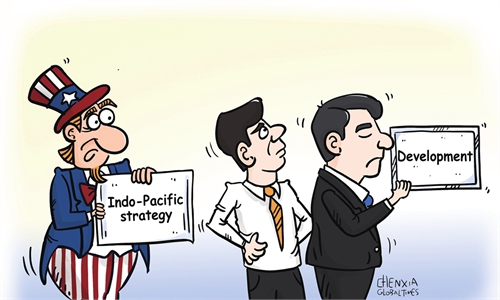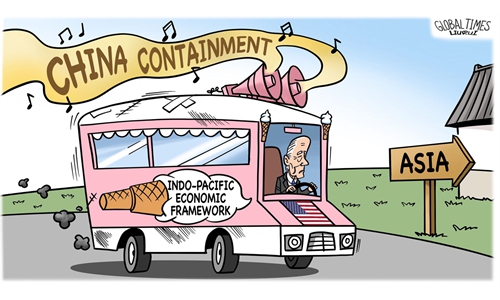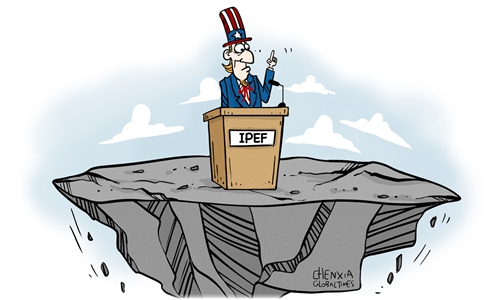US kicks off IPEF meeting with bizarre aim of excluding a country ubiquitous in industrial chains
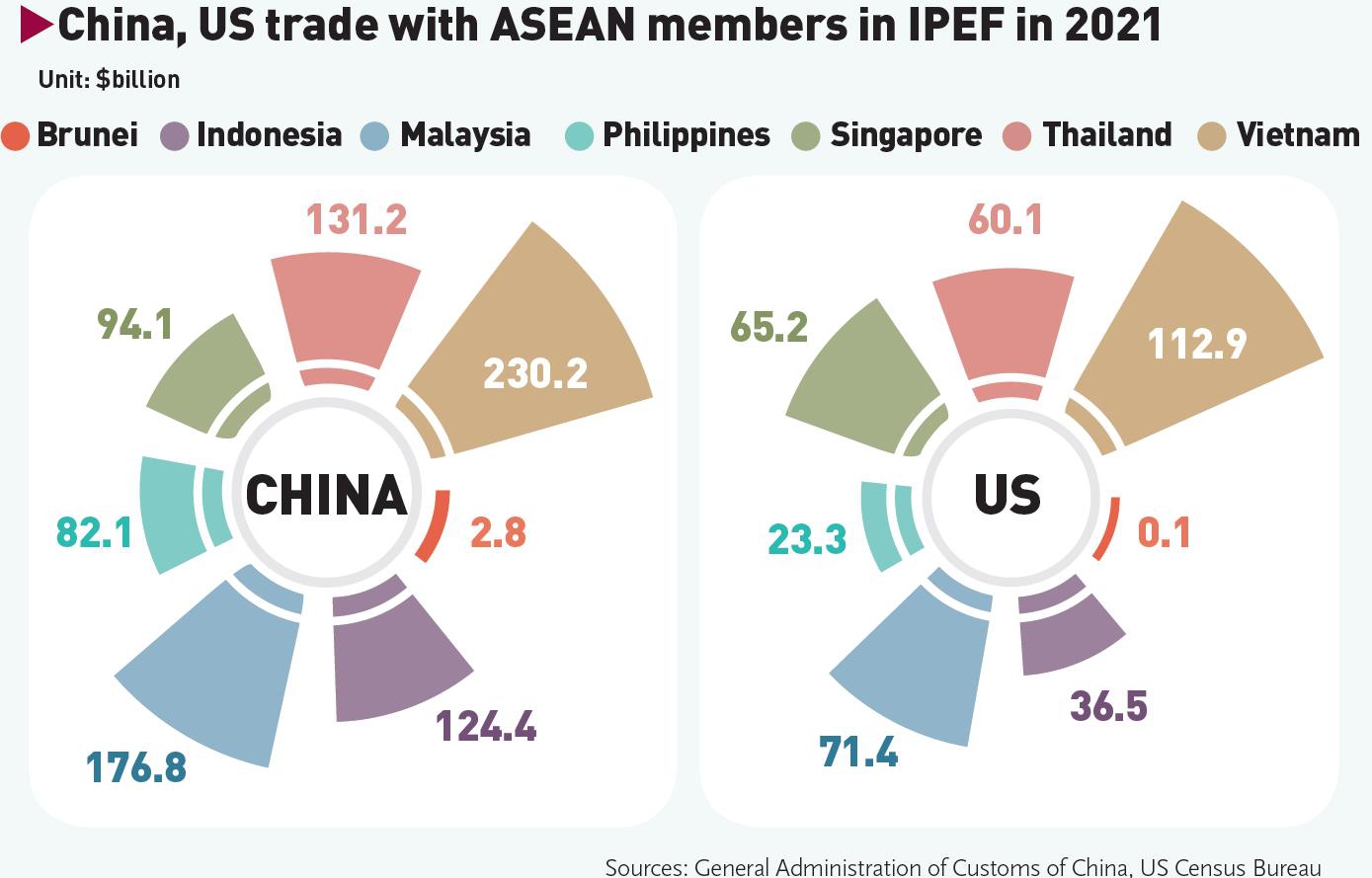
China, US trade with ASEAN members in IPEF in 2021 Graphic: GT
The two-day meeting of the IPEF in Los Angeles is the first face-to-face ministerial talks of the states since US President Joe Biden launched the framework while visiting Japan in May. The 13 countries set to attend the two-day meeting include Australia, Japan, South Korea, New Zealand, Singapore, and Vietnam.
According to Japanese media, these countries are expected to determine which countries will join negotiations for the policy pillars of fair trade, supply chain resilience, infrastructure and clean energy, and measures against tax avoidance and corruption, and an outcome will be released in a post-meeting document.
They also noted that while countries around the world are working hard to develop their economies in the face of inflation and economic difficulties, the US is the only one that is working hard to attack another country, and such a troublemaker has brought continuous disturbances to the world.
US Trade Representative Katherine Tai and US Secretary of Commerce Gina Raimondo are reportedly co-hosting the IPEF meeting. Japanese Economy, Trade and Industry Minister Yasutoshi Nishimura, South Korean Trade Minister Ahn Duk-geun, India's Commerce and Industry Minister Piyush Goyal, and senior trade officials from other countries also reportedly flew to Los Angeles to attend the meeting.
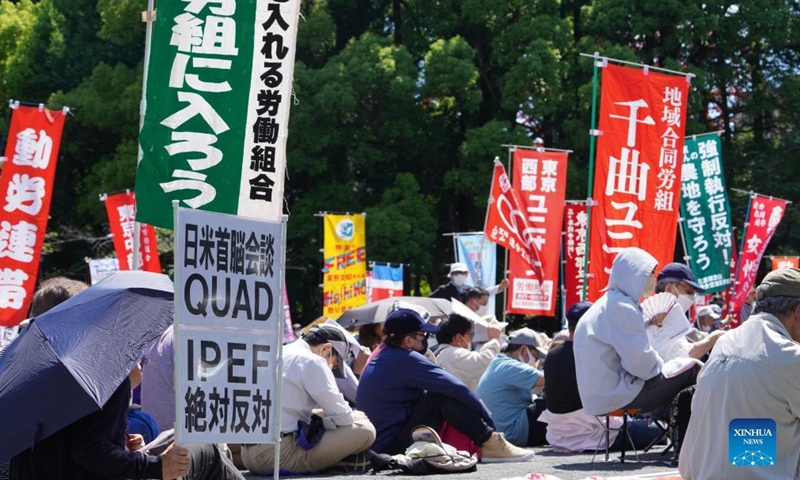
Protesters gather at Shiba Park in Tokyo, Japan, May 22, 2022. US President Joe Biden arrived in Japan on Sunday, as about 750 protesters took to the streets here against the planned U.S.-Japan summit and the summit of the Quadrilateral Security Dialogue (the Quad). Photo:Xinhua
'Stick but no carrot'
As the first offline meeting for the IPEF, member states will focus on reaching consensus on the timetable, phased target, and main agenda for the framework. Member states will hold discussions on the four pillar policies and make choices among them for detailed negotiation projects, Xu Liping, a research fellow on Southeast Asian studies at the Chinese Academy of Social Sciences in Beijing, told the Global Times.
"It is more like member states having to take orders from a menu pre-set by the US - this is not fair. The US is the one that sets the standards while other countries have been put in an inferior position either in the negotiations or under the framework," said Xu.
The Biden administration is hoping negotiations related to each pillar will conclude in one year or up to 18 months, according to the Center for Strategic and International Studies, a Washington think tank. Japan Times reported that the summit meeting of the Asia-Pacific Economic Cooperation in November 2023 is viewed as the informal deadline for finalizing IPEF.
Among the four pillars, negotiations on fair trade, tax and anti-corruption will be difficult, since they are related to how to draw up standards when the IPEF has excluded issues on tax tariff reduction. On supply chain resilience, consensus may be easier to reach on medical supplies but will be difficult on crucial technologies or materials related to semiconductors, Xu said.
Xu pointed out that the IPEF, which puts so-called democratic values at its core, aims to build supply chains without China, reinforce decoupling with China in technology, and form an alliance of technology and barriers of rules to restrict technologies or innovations from flowing to China.
The IPEF, which is different from conventional trade agreements that usually involve tariff cuts, focuses on "setting high standards" in new areas such as the digital economy and supply chains for semiconductors and other strategically important materials, and analysts have interpreted it as the US' latest move to compete with China's increasing economic influence. However, the US' ambition with the IPEF seems difficult to realize.
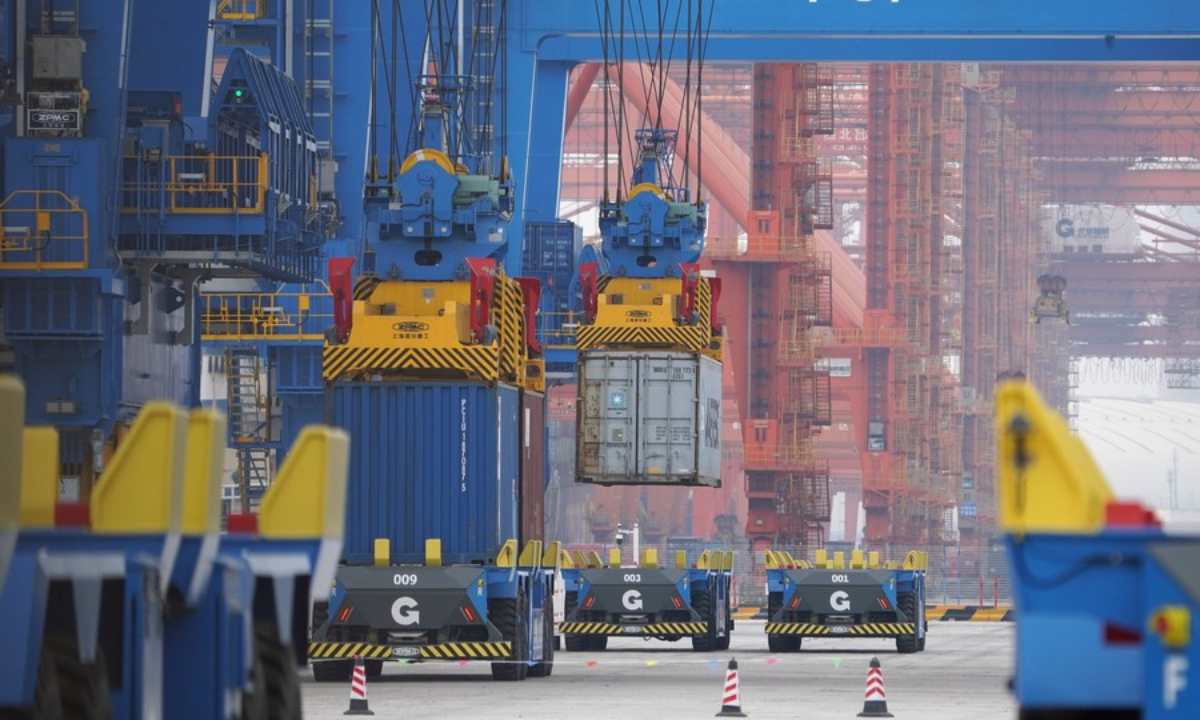
Photo taken on Oct 27, 2021 shows an automated container berth undergoing equipment debugging in Qinzhou Port, Beibu Gulf Port in south China's Guangxi Zhuang Autonomous Region. Photo:Xinhua
The IPEF is a product made by the US government while the US is in decline but trying to create anti-China supply chains. The framework, which has no content on the US' surrendering profits to other countries in the Indo-Pacific, will see less participation from these counties, Lan Jianxue, director of the Department for Asia-Pacific Studies at the China Institute of International Studies, told the Global Times.
For example, many ASEAN countries that are also included in the IPEF have long expected to expand exports to the US, while the US has excluded tariff reductions from the IPEF agenda but brought its own standards on labor and working environments - "this is more like a strategy of 'stick plus stick without carrot,'" said Xu.
Aside from ASEAN countries, India is also a target that the US is keen on drawing into its small circle of the IPEF and making it play a larger role in the region to serve the US' goal of containing China's development. However, the US has little to offer to India, said Liu Xiaoxue, an associate research fellow at the National Institute of International Strategy of the Chinese Academy of Social Sciences.
"Since former US president Donald Trump, the US has been pressuring India to buy more American goods, including agricultural products and energy, but tightened immigration to the US. India hopes that the US could consider it a true ally by joining the IPEF, expand its market for exports of more Indian products, and loosen visa restrictions for IT talent," Liu told the Global Times, noting that the IPEF will not meet India's expectations.
Among the state members, the US has placed great expectations on South Korea and Japan - its two Asian allies - to support the IPEF, but both Japanese and South Korean media have expressed deep concerns over the framework.
For example, Yoshioka Keiko from Japanese media outlet Asahi Shimbun wrote in an article on August 29 that in Asia, economic cooperation without the US has expanded, a situation created by the US itself as former president Donald Trump withdrew from the Trans-Pacific Partnership (TPP) trade deal and skipped many international meetings held in Asia. The IPEF has not received support from the US Congress as the midterm elections approach, whose result may make it "rootless duckweed."
Li Tianguo, associate professor at the National Institute of International Strategy, said that having formed close industrial ties with China after decades of development, both Japan and South Korea hope to maintain supply chain stability and normal production order to hedge external risks amid anti-globalization trend, intensifying geopolitical tensions and the protracted pandemic. They have also developed long-term cooperation with China in key sectors including semiconductors, rare earths, and storage batteries.
"However, their appeals do not accommodate the US' strategic goal of containing China, and thus even if they have strong willingness or requests for opening-up and cooperation in certain aspects, the US may coldly refuse them," Li said.
He cited the example of the Inflation Reduction Act recently passed in the US, which excludes electric vehicles (EVs) assembled outside North America from tax incentives, sparking widespread concerns and criticism from South Korea, as many South Korean carmakers will lose competitiveness in the US as they produce EVs at domestic facilities for export.
The IPEF will not go far and the US' attempt to build supply chains without China will not succeed either, analysts concluded.
Xu said that while the world experiences multiple challenges, especially the Ukraine crisis, energy crisis and severe inflation, and global efforts have been called for to overcome the difficulties, the US' attempt to form small economic circles is not only improper but also not helpful in dealing with the current crises.
Analysts also noted that Asia has become a region with multi-polarized economic situations, with no country having a single strategic framework able to dominate, and the trend of global multi-polarization cannot be changed by the US.

